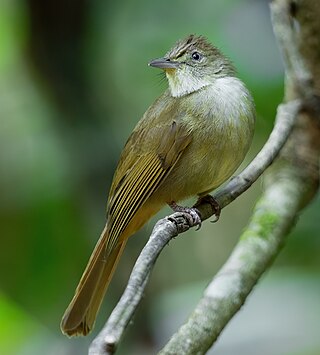Related Research Articles

Coprosma is a genus of flowering plants in the family Rubiaceae. It is found in New Zealand, Hawaiian Islands, Borneo, Java, New Guinea, islands of the Pacific Ocean to Australia and the Juan Fernández Islands.

Ulmus davidiana var. japonica, the Japanese elm, is one of the larger and more graceful Asiatic elms, endemic to much of continental northeast Asia and Japan, where it grows in swamp forest on young alluvial soils, although much of this habitat has now been lost to intensive rice cultivation.

Holbrookia propinqua, commonly known as the keeled earless lizard, is a species of phrynosomatid lizard.

The grey-eyed bulbul is a species of songbird in the bulbul family, Pycnonotidae. It is found in Southeast Asia in its natural habitat of subtropical or tropical moist lowland forests.

Coprosma propinqua is a New Zealand plant of the genus Coprosma in the family Rubiaceae. It is a widely-distributed small leaved divaricating shrub found throughout New Zealand.

Eucalyptus propinqua, commonly known as the grey gum or small-fruited grey gum, is a species of medium-sized to tall tree that is endemic to eastern Australia. It has smooth, mottled bark, lance-shaped to curved adult leaves that are paler on the lower surface, flower buds in groups of between seven and fifteen, white flowers and conical or hemispherical fruit.

Spatalla is a genus containing 20 species of flowering plants, commonly known as "spoons", in the family Proteaceae. The genus is endemic to the Cape Floristic Region of South Africa where it is associated with fynbos habitats. The species are all small shrubs. The name is derived from the Greek, meaning “wantonness”, alluding to the plants’ unusually large pollen-presenters. Most species are threatened.

Colobotheini is a tribe of longhorn beetles of the subfamily Lamiinae.

Colobothea is a genus of longhorn beetles of the subfamily Lamiinae.
Colobothea olivencia is a species of beetle in the family Cerambycidae. It was described by Bates in 1865. It is known from Brazil.
Colobothea unilineata is a species of beetle in the family Cerambycidae. It was described by Bates in 1872. It is known from Nicaragua and Panama.
Colobothea guatemalena is a species of beetle in the family Cerambycidae. It was described by Henry Walter Bates in 1881.
Colobothea parcens is a species of beetle in the family Cerambycidae. It was described by Bates in 1881. It is known from Belize, Guatemala, Honduras and Mexico.
Colobothea amoena is a species of beetle in the family Cerambycidae. It was described by Gahan in 1889. It is known from Brazil.
Colobothea plagiata is a species of beetle in the family Cerambycidae. It was described by Per Olof Christopher Aurivillius in 1902 and is known from Colombia.
Colobothea andina is a species of beetle in the family Cerambycidae. It was described by Monné in 1993. It is known from Peru.
Colobothea cincticornis is a species of beetle in the family Cerambycidae. It was described by Schaller in 1783.
Colobothea subcincta is a species of beetle in the family Cerambycidae. It was described by Laporte in 1840. It is known from Brazil.

Spatalla propinqua, the lax spoon, is a flower-bearing shrub belonging to genus Spatalla, and forming a part of the fynbos vegetation. The plant is native to the Western Cape of South Africa.

Malesherbia humilis is an annual herb that grows in the subtropics of northern and central Chile to Argentina.
References
- ↑ BioLib.cz - Colobothea propinqua. Retrieved on 8 September 2014.